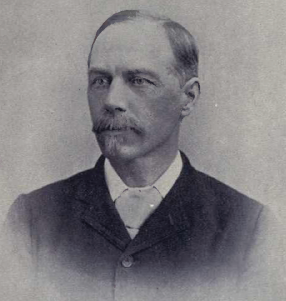List of presidents
- This table represents the list of presidents of the exchange.
The exchange had 97 presidents, Of which:
- The first chairman is Daniel Hunter McMillan;
- The last chairman is C. Swartz;
|  |
The Winnipeg Grain Exchange (Known too as ICE Futures Canada) was established in 1887, and dissolved in 1986. [1] It was also the predecessor of the Winnipeg Commodity Exchange.
The exchange had 97 presidents, Of which:
|  |

The Archer-Daniels-Midland Company, commonly known as ADM, is an American multinational food processing and commodities trading corporation founded in 1902 and headquartered in Chicago, Illinois. The company operates more than 270 plants and 420 crop procurement facilities worldwide, where cereal grains and oilseeds are processed into products used in food, beverage, nutraceutical, industrial, and animal feed markets worldwide.

The Commodity Futures Trading Commission (CFTC) is an independent agency of the US government created in 1974, that regulates the U.S. derivatives markets, which includes futures, swaps, and certain kinds of options.

Sir Daniel Hunter McMillan, was a Manitoba politician. He was a cabinet minister in Thomas Greenway's government from 1889 to 1900, and served as the seventh Lieutenant Governor of Manitoba from 1900 to 1911.
Otto Emil Lang, is a Canadian lawyer and former politician.
The Winnipeg Commodity Exchange is the former name of a derivatives market based in Winnipeg, Manitoba, Canada now known as ICE Futures Canada. Futures and options contracts are electronically traded in western barley and canola (rapeseed).

William Linton Parrish was a politician in Manitoba, Canada. He served in the Legislative Assembly of Manitoba from 1914 to 1920 as a member of the Liberal Party.
Zhengzhou Commodity Exchange, established in 1990, is a futures exchange in Zhengzhou, one of the four futures exchanges in China. The ZCE is under the vertical management of China Securities Regulatory Commission (CSRC).

A corn exchange is a building where merchants trade grains. The word "corn" in British English denotes all cereal grains, such as wheat and barley; in the United States these buildings were called grain exchange. Such trade was common in towns and cities across England until the 19th century, but as the trade became centralised in the 20th century many such buildings were used for other purposes. Several have since become historical landmarks.

The Exchange District is a National Historic Site of Canada in the downtown area of Winnipeg, Manitoba, Canada. Just one block north of Portage and Main, the Exchange District comprises twenty city blocks and approximately 150 heritage buildings, and it is known for its intact early 20th century collection of warehouses, financial institutions, and early terra cotta clad skyscrapers.

James Armstrong Richardson Sr. was an influential business person in Canada in both business and aviation during the early part of the 20th century. He lived most of his life in Winnipeg.
Nicholas Bawlf was a Canadian grain merchant, and important figure in the development of Winnipeg as the centre of the Canadian grain trade.

A wheat pool is a co-operative that markets grain on behalf of its farmer-members.

Charles Alexander Young was a grain dealer and political figure in Manitoba, Canada. He represented Deloraine from 1896 to 1903 in the Legislative Assembly of Manitoba as a Liberal.
The Manitoba Grain Growers' Association (MGGA) was a farmer's association that was active in Manitoba, Canada in the first two decades of the 20th century. It provided a voice for farmers in their struggle with grain dealers and the railways, and was influential in obtaining favorable legislation. The MGGA supported the Grain Growers' Grain Company, a cooperative of prairie farmers, and its organ the Grain Growers' Guide. At first it remained neutral politically, but in 1920 it restructured as the United Farmers of Manitoba in preparation for becoming a political party.
The Territorial Grain Growers' Association (TGGA) was a farmer's association that was active in Western Canada at the start of the 20th century, in what was then the Northwest Territories and later became Saskatchewan and Alberta. It provided a voice for farmers in their struggle with grain dealers and the railways, and was influential in obtaining favorable legislation. After Alberta and Saskatchewan became provinces the TGGA was succeeded by the Alberta Farmers' Association and the Saskatchewan Grain Growers' Association.

Edward Alexander Partridge was a Canadian teacher, farmer, agrarian radical, businessman and author. He was born in Ontario but moved to Saskatchewan where he taught and then became a farmer. He was active in the Territorial Grain Growers' Association (TGGA), founded in 1902, which addressed various problems with the Western Canada grain market. He founded the cooperative Grain Growers' Grain Company, the predecessor of the United Grain Growers, and the Grain Growers' Guide, a widely distributed weekly paper. His "Partridge Plan" was a broad and visionary proposal for addressing a wide range of farmers' issues, eliminating many abuses caused by the near-monopoly of grain elevator companies, and resulted in important reforms by the provincial governments. Patridge was named a National Historic Person in 2018.

The Grain Growers' Grain Company (GGGC) was a farmers' cooperative founded in the prairie provinces of western Canada in 1906. The GGGC met strong resistance from existing grain dealers. It was forced off the Winnipeg Grain Exchange and almost failed. With help from the Manitoba government it regained its seat on the exchange, and soon had a profitable grain trading business. The company founded the Grain Growers' Guide, which became the most popular farmer's newspaper in the region. In 1912 the GGGC began operating inland and terminal grain elevators, and in 1913 moved into the farm supply business. The GGGC was financially secure and owned or operated almost 200 elevators as well as 122 coals sheds and 145 warehouses by the time it merged with the Alberta Farmers' Co-operative Elevator Company to form the United Grain Growers in 1917.
StandardAero is a maintenance, repair and overhaul (MRO) provider based in Scottsdale, AZ. The company is not related to Standard Aircraft Corporation, which was formed in 1916 and ceased operations in 1931 as New Standard Aircraft Company.
Ernest John Smith was a Canadian architect.

Harry John Sterling was a Canadian ice hockey administrator. He was elected president of the Canadian Amateur Hockey Association (CAHA) in 1920, after serving as an Ontario Hockey Association executive and as president of the Thunder Bay Amateur Hockey Association. He was suspicious of players who changed their addresses for the purpose of playing on a new team and declared that the CAHA would not tolerate the hockey "tourist". His investigation into registrations led to the suspension of a team from Saskatoon when it discovered that players who won the gold medal representing Canada in ice hockey at the 1920 Summer Olympics were being paid for amateur hockey. His term as president resulted in the CAHA enacting stricter rules for registration and co-operation with the Amateur Athletic Union of Canada to investigate into all Canadian hockey players to maintain amateurism.